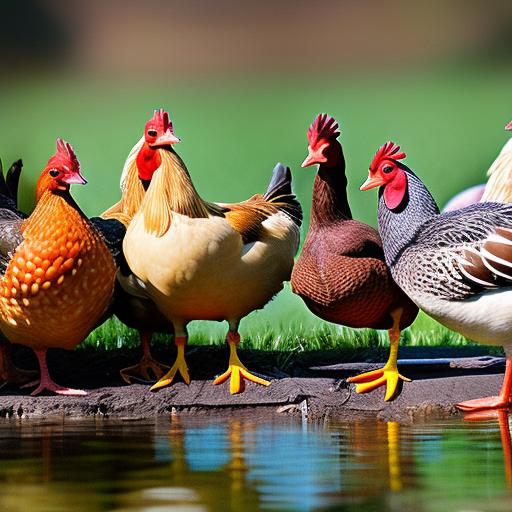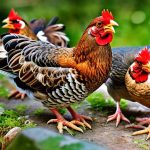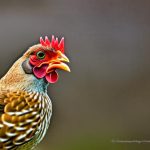Keeping chickens and ducks together can be a rewarding and enjoyable experience for poultry enthusiasts. Not only do these two species provide fresh eggs and entertainment, but they can also have a mutually beneficial relationship. As someone who has kept chickens and ducks together for several years, I can attest to the joy and satisfaction that comes from observing their interactions and caring for them.
Key Takeaways
- Keeping chickens and ducks together is possible and can be beneficial.
- Chickens and ducks have different behaviors and needs, but can coexist peacefully.
- Benefits of keeping chickens and ducks together include pest control and increased egg production.
- Choosing the right breeds is important to ensure compatibility and optimal egg production.
- Housing and feeding requirements should be tailored to meet the needs of both chickens and ducks.
Understanding the Nature of Chickens and Ducks
Chickens and ducks have distinct differences in behavior and temperament. Chickens are generally more social and hierarchical, with a pecking order established within the flock. They are also more ground-dwelling birds, spending most of their time foraging on the ground. Ducks, on the other hand, are more independent and less hierarchical. They are known for their love of water and enjoy swimming and dabbling in shallow ponds or pools.
When kept together, chickens and ducks can form a unique bond. Chickens often take on a protective role towards ducks, acting as their guardians. Ducks, in turn, can help keep the chicken coop clean by eating insects and pests that may be harmful to both species. It is important to note that while chickens and ducks can coexist peacefully, there may be occasional squabbles over food or territory.
Benefits of Keeping Chickens and Ducks Together
One of the main benefits of keeping chickens and ducks together is the mutual benefits they provide for each other. Chickens can help protect ducks from predators due to their alert nature and ability to fly short distances if necessary. Ducks, on the other hand, can help keep the chicken coop clean by eating insects and pests that may be harmful to both species.
Another benefit of keeping chickens and ducks together is the increased diversity in your flock. This can add visual interest to your poultry yard and create a more dynamic environment. Additionally, having both chickens and ducks can provide a wider variety of eggs, with chickens laying traditional eggs and ducks laying larger, richer eggs.
Choosing the Right Breeds for Your Flock
When selecting breeds for a mixed flock of chickens and ducks, there are several factors to consider. First, it is important to choose breeds that have similar temperaments and can coexist peacefully. Some chicken breeds, such as Orpingtons and Australorps, are known for their calm and friendly nature, making them good choices for mixed flocks.
For ducks, breeds such as Pekins and Khaki Campbells are often recommended for their docile nature and ability to adapt well to different environments. It is also important to consider the size of the birds when choosing breeds, as larger ducks may unintentionally harm smaller chicken breeds.
Housing Requirements for Chickens and Ducks
When housing chickens and ducks together, it is important to provide a coop and run that meets the needs of both species. The coop should be spacious enough to accommodate both chickens and ducks comfortably, with separate areas for nesting and roosting.
Nesting boxes should be provided for the chickens, as they prefer to lay their eggs in a secluded area. Ducks, on the other hand, do not require nesting boxes but will appreciate a shallow pool or pond for swimming and dabbling.
The run should be secure and predator-proof, with fencing that is tall enough to prevent the ducks from flying out. It is also important to provide ample shade and shelter from the elements, as both chickens and ducks can be sensitive to extreme temperatures.
Feeding and Watering Chickens and Ducks

Chickens and ducks have different nutritional needs, but they can be fed together with some adjustments. Chickens require a balanced diet that includes a mix of grains, protein, fruits, and vegetables. They also need access to grit for proper digestion.
Ducks have a higher protein requirement than chickens, so it is important to provide them with a feed that is specifically formulated for ducks. They also require access to water for drinking and bathing, as ducks have a natural oil gland that needs to be regularly maintained.
When feeding chickens and ducks together, it is important to monitor their intake and ensure that each species is getting the appropriate nutrients. It may be necessary to provide separate feeding areas or use feeders that can accommodate both species.
Health and Hygiene Considerations
Keeping chickens and ducks together requires regular monitoring of their health and hygiene. Both species are susceptible to certain diseases and parasites, so it is important to be vigilant and take preventive measures.
Common health issues to watch for include respiratory infections, mites, lice, and fungal infections. Regular cleaning and sanitation practices, such as regularly cleaning the coop and providing fresh bedding, can help prevent the spread of disease.
It is also important to provide clean water sources for both chickens and ducks. Ducks require access to water for drinking and bathing, so it is important to regularly clean and refill their water containers to prevent the growth of bacteria.
Managing Social Dynamics within the Flock
Introducing new birds to an existing flock can be a delicate process, especially when mixing different species. It is important to introduce new birds gradually and monitor their interactions closely.
When introducing new chickens or ducks, it is best to do so when they are young and still small in size. This can help minimize aggression from the existing flock. It is also helpful to provide separate areas within the coop or run where new birds can retreat if they feel threatened.
If aggression or bullying occurs within the flock, it may be necessary to separate the birds temporarily until they can coexist peacefully. Providing ample space, hiding spots, and distractions such as toys or treats can help alleviate tension within the flock.
Egg Production and Collection
Chickens and ducks have different egg laying habits, so it is important to understand their individual needs when it comes to egg production and collection. Chickens typically lay their eggs in nesting boxes, which should be checked and cleaned regularly.
Ducks, on the other hand, may lay their eggs in a variety of locations, including hidden spots in the coop or run. It is important to provide nesting material such as straw or shavings to encourage ducks to lay their eggs in a designated area.
When collecting eggs from both chickens and ducks, it is important to handle them gently and store them properly. Eggs should be cleaned if necessary, but not washed, as this can remove the protective coating on the shell. Eggs should be stored in a cool, dry place and consumed within a reasonable timeframe.
Is Keeping Chickens and Ducks Together Right for You?
Keeping chickens and ducks together can be a rewarding and enjoyable experience for poultry enthusiasts. The mutual benefits they provide for each other, as well as the increased diversity in your flock, can make this arrangement worthwhile.
However, it is important to consider the specific needs and requirements of both chickens and ducks before deciding to keep them together. Providing appropriate housing, feeding, and care is essential for the health and well-being of both species.
If you are considering keeping chickens and ducks together, I would encourage you to do your research and consult with experienced poultry keepers. With proper planning and management, a mixed flock of chickens and ducks can provide years of enjoyment and fresh eggs.
If you’re considering keeping chickens and ducks together, it’s important to understand the dynamics and requirements of both species. While they can coexist harmoniously, there are certain considerations to keep in mind. One related article that provides valuable insights is “The Chicken Coop Country Diner” by Poultry Wizard. This article discusses the benefits of providing a shared space for chickens and ducks, highlighting the importance of proper coop design and management. To learn more about creating a suitable environment for these feathered friends, check out the article here.
FAQs
Can chickens and ducks live together?
Yes, chickens and ducks can live together in the same coop and run as long as they have enough space and resources.
What are the benefits of keeping chickens and ducks together?
Keeping chickens and ducks together can provide a variety of benefits, including increased egg production, pest control, and entertainment.
What are the challenges of keeping chickens and ducks together?
The main challenge of keeping chickens and ducks together is that they have different dietary needs, so it can be difficult to provide them with appropriate feed. Additionally, ducks require more water than chickens, which can create a mess in the coop.
What should I feed my chickens and ducks if I keep them together?
It is important to provide both chickens and ducks with a balanced diet that meets their specific nutritional needs. This may require separate feeding stations or a specialized feed that is appropriate for both species.
How much space do chickens and ducks need if they are kept together?
Chickens and ducks require a minimum of 4 square feet of space per bird in the coop and 10 square feet of space per bird in the run. However, it is recommended to provide more space if possible to prevent overcrowding and reduce the risk of disease.
What are some tips for keeping chickens and ducks together?
Some tips for keeping chickens and ducks together include providing plenty of space, ensuring access to clean water, providing appropriate feed, and monitoring the birds for signs of illness or aggression. It is also important to keep the coop and run clean and well-maintained.
Meet Walter, the feathered-friend fanatic of Florida! Nestled in the sunshine state, Walter struts through life with his feathered companions, clucking his way to happiness. With a coop that’s fancier than a five-star hotel, he’s the Don Juan of the chicken world. When he’s not teaching his hens to do the cha-cha, you’ll find him in a heated debate with his prized rooster, Sir Clucks-a-Lot. Walter’s poultry passion is no yolk; he’s the sunny-side-up guy you never knew you needed in your flock of friends!







